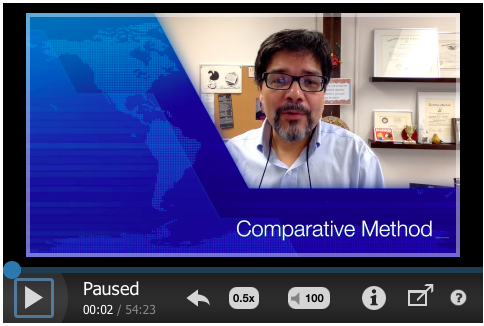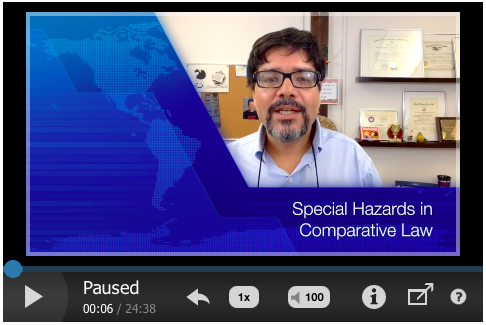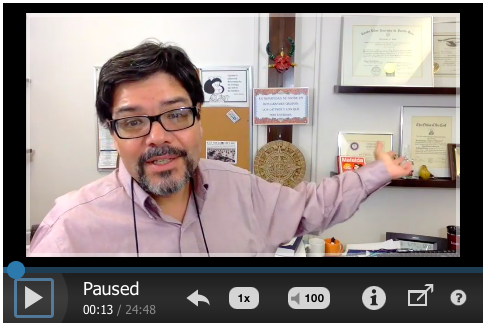Comparative Law JD Offerings
LAW 6250: Comparative Law (2-3 credits)
Professor Pedro A. Malavet
Class Number 16002
Section 155D
Professor Pedro A. Malavet
Spring 2020 (2 Credits)
Mondays from 1:30 to 3:30 p.m.
Room 355A
LAW 6930: Foreign Enrichment: Business and Legal Environments in Latin America (2 credits)
Last Taught:
Fall
2015
LAW 6930: Comparative Procedure (2 credits)
Last Taught:
Summer
2015
Exam Spring 2020
First-Day Assignments Spring 2020
- Our class materials: The required materials are a collection of edited texts, The Comparative Method: Legal History and Culture in Comparison, that I will make available in the course Canvas page (FILES-->Handouts Spring 2020). I will hand out the materials as I update them throughout the semester. I will also supplement this collection with a few additional handouts that will likewise be available for download on canvas.
- Assignment Sheets. I will post weekly assignment sheets with specific assignments in the course website (http://plaza.ufl.edu/malavet/comparat/clmain.shtml). I will attempt to structure assignments by class session. Students, especially those who sign-up for a particular class, should check with me to make sure what material will be covered.
- I will also post the assignments in the Canvas page as it is likely that the servers that have hosted my website for 20 years will be soon be taken down by the university.
I. Week 1: Introduction to Comparative Law (Handout 1)
- Monday, January 13, 2020
Session 1.a.- Course Overview, rules and expectations
Read the Syllabus. - Chapter 1: Detailed Course Coverage: Overview
Handout No. 1, pages 1-23 - Session 1.b.
- Chapter 1: Pedagogical Expectations and Assessment: The Examination
Handout No. 1, pages 23-30
- Chapter 1: Pedagogical Expectations and Assessment: The Examination
- Course Overview, rules and expectations
What is Comparative Law?
The Comparative Method
What are some of the Special Challenges
of Comparative Law Practice?
Course Overview and Syllabus Video
- I prepared this video for Comparative Procedure, the course I taught in the Summer 2015 Program in France. But it provides a general overview of my approach to the Comparative Law courses. Naturally, some items are very specific to the topic, and to the nature of the program. For example, the no-long-weekends rule at the 15-minute mark was very much limited to the France program for the reasons that are clearly stated on the video.
Course Description: Comparative Law
An introduction to the comparative method from the perspective of an American lawyer, focusing on methodology, rather than on substantive matters. Starts with a survey of Comparative Law, its history, current definition and scope, followed by practical uses of Comparative legal analysis in United States courts. The more substantial part of the semester studies the Civil Law tradition, the most common legal system in our world today. We start with foreign legal education and the legal professions, a critical matter for proper delivery of legal services to foreign clients and working effectively with international law partners. Then the Civil law system is placed in its proper context: historical roots; structure; approach to judicial review; judicial organization. We finish with a discussion of comparative constitutional law and modern legal systems.
Comparative Law is Especially Important for a Florida Lawyer
Comparative Law, or more precisely the Comparative Method, allows you to understand law, legal transactions, legal problems, legal professionals and clients that are foreign to you.
This is an especially useful tool for a Florida lawyer.
Florida has a very large population of persons who were born in or trace their roots to countries other than the United States. That means that a Florida lawyer will easily find herself faced by the challenge of explaining Florida law to a client whose legal culture is based on a non-United States experience.
Bridging this cultural gap will be critical to proper client service. The lawyers who are good at this will not only provide high-quality professional services, they give themselves a competitive advantage in the legal services market in this state.
Additionally, the Florida lawyer may find himself advising a client who needs to resolve a legal problem in his or her home country, or a client whose only connection to the foreign country is the need to complete a legal transaction abroad. Assisting such clients is an especially important professional opportunity in the Florida legal services market.
That is what Comparative Law is about. Allowing the students at the Levin College of Law to put their legal training in the law and legal system of the United States at the service of clients for whom and legal systems in which we are foreign.
Course Description: Foreign Enrichment: Business and Legal Environments in Latin America
This two-credit course will be taught in a condensed schedule of twenty (20) sessions of seventy (70) minutes in order to accommodate the busy schedules of the practitioners who will bring us their considerable experience. It will start on Tuesday, September 8, 2015 and end in October, 2015.
The course will start with an orientation and overview by Professor Pedro A. Malavet. The substance of the course will be taught by three outstanding professors with extensive practice experience in Latin America, whose short bios are included below.
Our first visitor, Professor Hugo Hurtado, a tax partner at Deloitte Touche Chile (http://www2.deloitte.com/cl/es.shtml#), will start teaching that Thursday, September 10 and will teach the entire week that follows. Prof. Hurtado has an LLM and SJD from our Tax Program. He is followed by Prof. Walter Keiniger, a tax partner in Marval O’Farrell (http://www.marval.com), the largest law firm in Buenos Aires, Argentina. He also holds an LLM from our Tax program. He will teach from September 21 to September 29. Our final visitor is Professor Javier Tous, a professor at the Universidad del Norte in Barranquilla, Colombia (http://www.uninorte.edu.co/). He will teach from October 5 to October 15.
Professor Hurtado will teach units on the general legal challenges of foreign direct investment in Latin America, especially the tax consequences and how tax treaties may apply; he will focus on the US-Chile tax treaty to illustrate the challenges of tax-planning when engaged in direct foreign investment. Professor Keiniger will teach about doing business generally, and direct investment in particular in Latin America, focusing on Argentina. He will discuss the challenges of complex international business contracts and adjusting to local laws and regulations, with special focus on currency exchange, profit-repatriation and local reinvestment and taxation rules. Professor Tous teaches about the intersection of corporate law and doing business generally with human rights, focusing on Latin America.
The visitors will record some sessions for future viewing in order to make the best use of their time in Gainesville. Levin College of Law Professors Pedro A. Malavet and Daniel Sokol will teach any sessions left open by the visitors.
Generally, the course seeks to enable students to answer a basic series of questions from an American business client wishing to do business in Latin America:
- How do you get your money in.
- How do you get your money out (or reinvest it for profit).
- How do you reduce business risk (legal uncertainty) while you are doing business in a country other than the United States. If pertinent, this should include a discussion of anti-corruption rules.
Each faculty visitor will produce a modest course packet with their readings and these will be distributed through a course Canvas page maintained by Professor Malavet.
Course Description: Comparative Procedure
An introduction to the comparative method from the perspective of an American lawyer, focusing on procedure, rather than on substantive matters. Starts with a survey of Comparative Law, its history, current definition and scope. The more substantial part of the semester studies procedure within the Civil Law tradition, the most common legal system in our world today. Given our location in France, I will use the French legal system as the primary point of comparison to the system of the United States. We will cover legal structure, including the ordinary and administrative court systems of France and the specialized operations of the Constitutional Council. We will cover civil, criminal, administrative and constitutional adjudication; the structure of the bodies in which they are practiced; and the professionals that work in each system.
Exams
- Spring 2005
- Summer 2005 (Montpellier)
- Spring 2006
- Spring 2007
- Fall 2007
- Spring 2009
- Spring 2011
- Spring 2012
- Spring 2013
- Spring 2015
- Summer 2015 (Montpellier)
- Spring 2016
- Fall 2016
- Spring 2018
- Spring 2019
Exam Feedback
Handouts
- None at this time.


